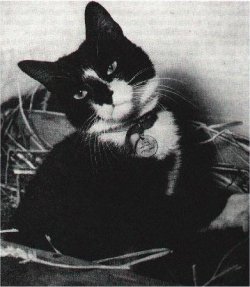Able Seacat Simon of HMS Amethyst

This is a story of a cat named Simon who was ship's cat on the HMS Amethyst, a British warship, just after the end of the second world war. Simon got his job in early 1948 when the HMS Amethyst pulled into port on Stonecutters Island, Hong Kong for a supplies. A seaman from the ship, George Hickinbotom found Simon on the dockyard looking sorry for himself and definitely in need of a good meal. George Hickinbotom decided to smuggle Simon onto the ship and at first hid him in his own cabin. Simon was about a year old at that time, and was too young to know the proverb about curiosity and cats. Unhappy at being confined to a small space of one cabin, he soon went exploring. The cat was out of the bag, so to speak, but fortunately the ship's captain was a cat lover as well, so it was not long before Simon could be seen following the captain about the ship on his regular inspections. From then on it was only a matter of time before Simon's feline charisma won over the whole crew. But Simon was not just a passenger. Soon after his arrival, he became a very skilled rat catcher. Rats were a big problem on the ship, creating havoc among food supplies. Once the crew discovered Simon's talents he was promoted in their minds from passenger to valued fellow crewman.
Then, in April 1949, Amethyst received orders to steam up the Yangtse river from Shanghai to Nanking to relieve HMS Consort, which was guarding the British Embassy. The communists were about to capture the town, and the personnel might have to be evacuated. HMS Amethyst had sailed 100 miles up the river when the ship came under heavy fire from a Communist army gun emplacement. The ship was grounded on a mudbank and the crew took heavy casualties, with many crew members, including the captain, injured or dead. Simon was among the injured, as he was hit by shrapnel from a shell which exploded near by. As any cat will do when injured, Simon crawled into one of the ship's crannies to hide, but after few days he emerged on the deck, probably driven by hunger. He was very ill and weak. Fortunately for Simon most of the injured crew had been evacuated to land to be treated in a nearby hospital, so the ship's doctor had time to attend to Simon's injuries. The shrapnel was removed and Simon was fed and rehydrated. Nevertheless, the cat was so weak that the doctor did not think that Simon would survive the night. However, Simon not only survived, but despite his injuries he was back on rat-catching duty a few days later. At that time keeping the rat population down was really necessary. The ship was stranded and two attempts at rescue by the British fleet had failed. The food supplies were running low, and there was certainly none to spare for the rats. Simon caught at least one rat a day, often more, which in itself was excellent for the crew's morale.
But there was one more duty for Simon whose his rank was now upgraded to Able Seacat Simon - the feline equivalent of Able Seaman. As the injured sailors were brought back to the ship the doctor thought that having Simon keep them company would help their morale and recovery. So from then on Simon divided his duty between catching rats and spending time on the bunks of injured crewmen, where he was indeed a friendly and comforting presence.
After 101 days the ship was repaired sufficiently to sail again. With no further possibility of rescue, the decision was made to run for it. So on the night of 30 July 1949, Amethyst left under cover of darkness, and after a brisk firefight with the shore batteries, made it to the open sea. On the first of August a special presentation was held to acknowledge the bravery of the crew. Among those honoured was Able Seacat Simon who received the Amethyst campaign ribbon. Word about Simon's huge contribution spread quickly and sit was decided that Simon should receive the PDSA Dickin Medal, which he was awarded in August 1949. The PDSA Dickin Medal is the most famous and the oldest of the charity's awards. Instituted in 1943 by the PDSA's founder Maria Dickin, it acknowledges outstanding acts of bravery displayed by animals serving with the Armed Forces or Civil Defence units in any war, worldwide. The Medal is recognised as 'The animals' Victoria Cross' and is the highest British honour for animal bravery in military conflicts.
Eventually HMS Amethyst sailed to England where Simon had to be confined to quarantine for six months (not even the most famous animals could avoid British quarantine regulations). But Simon was probably the most pampered animal in the quarantine quarters. He received lots of attention from the quarantine staff as well as frequent visits from his crew friends. The PDSA Dickin Medal presentation was set for 11 of December. Sadly only three weeks after his arrival in England, Simon became very ill with a viral infection. Although he was rushed to the vet immediately, Simon's heart already weakened by his war injuries, and his system was unable to cope with the new disease. He died on the 28th of November 1949. He is buried in the PDSA's animal cemetery at Ilford, east of London. The message on his gravestone says:
IN
MEMORY OF
"SIMON"
SERVED IN
H.M.S. AMETHYST
MAY 1948 - SEPTEMBER 1949
AWARDED DICKIN MEDAL
AUGUST 1949
DIED 28TH NOVEMBER 1949.
THROUGHOUT THE YANGTZE INCIDENT
HIS BEHAVIOUR WAS OF THE HIGHEST ORDER
